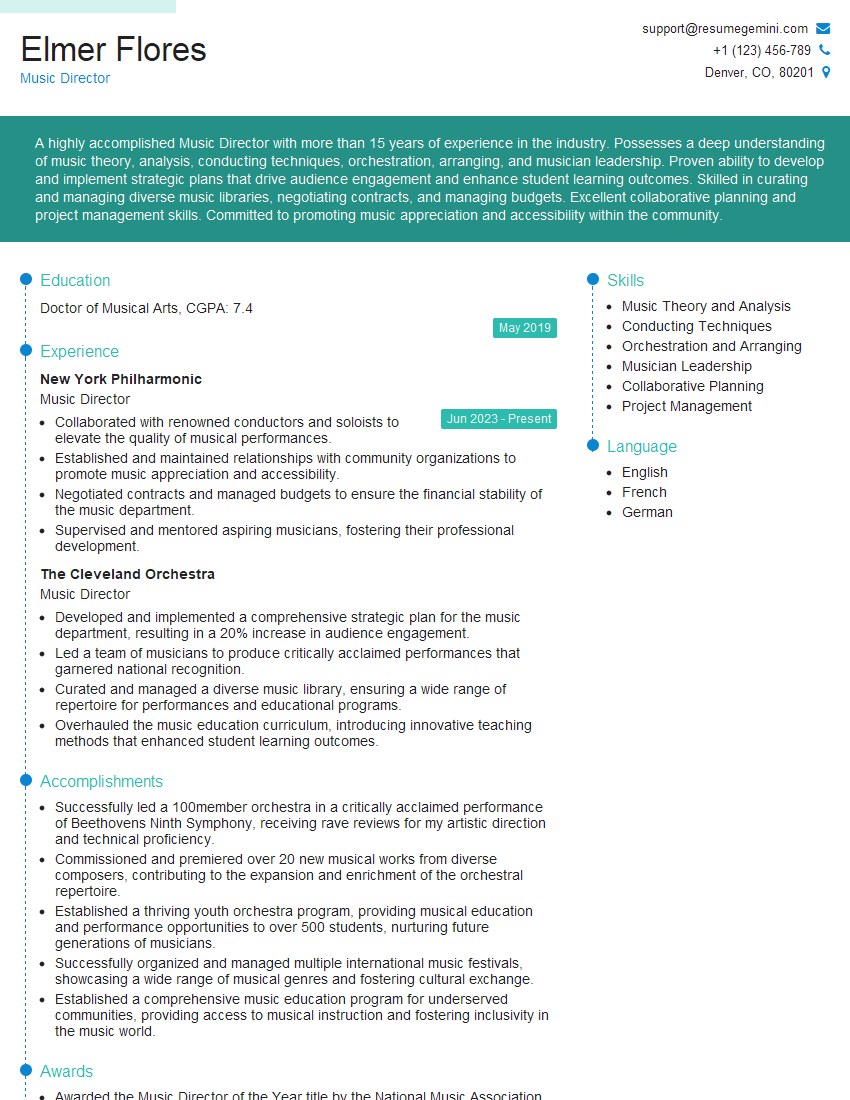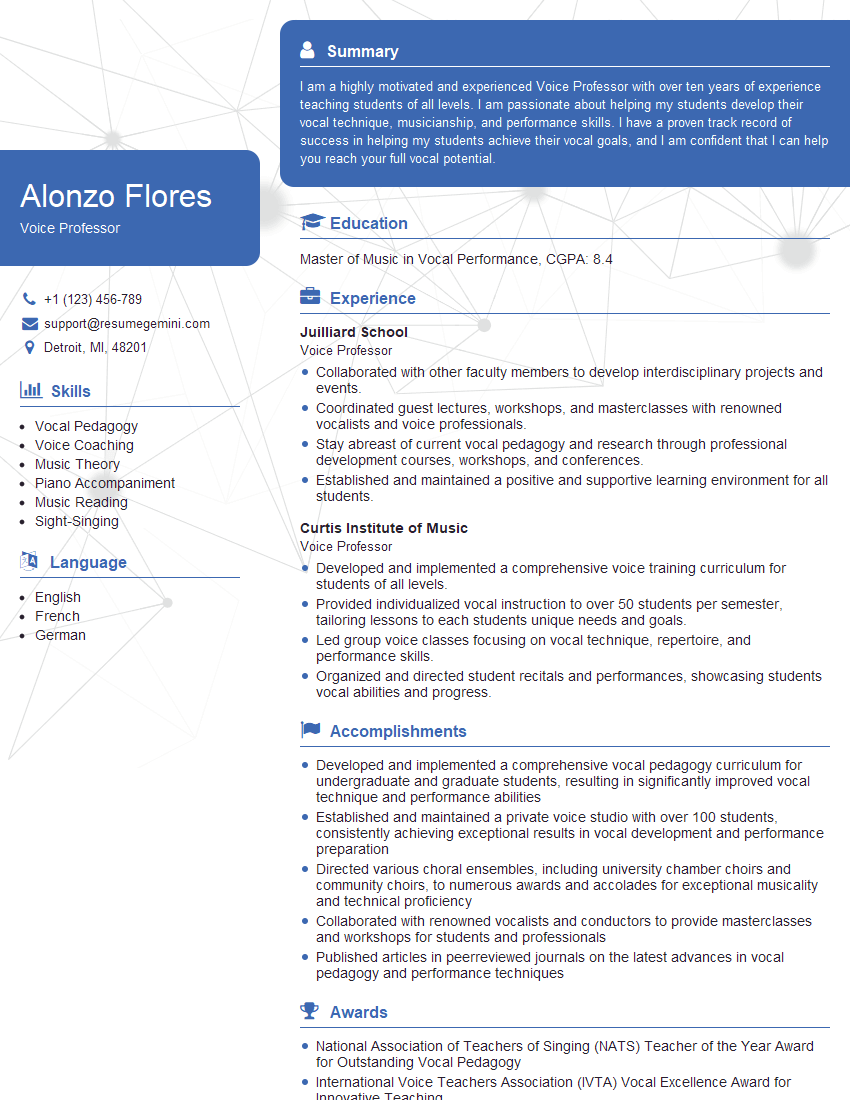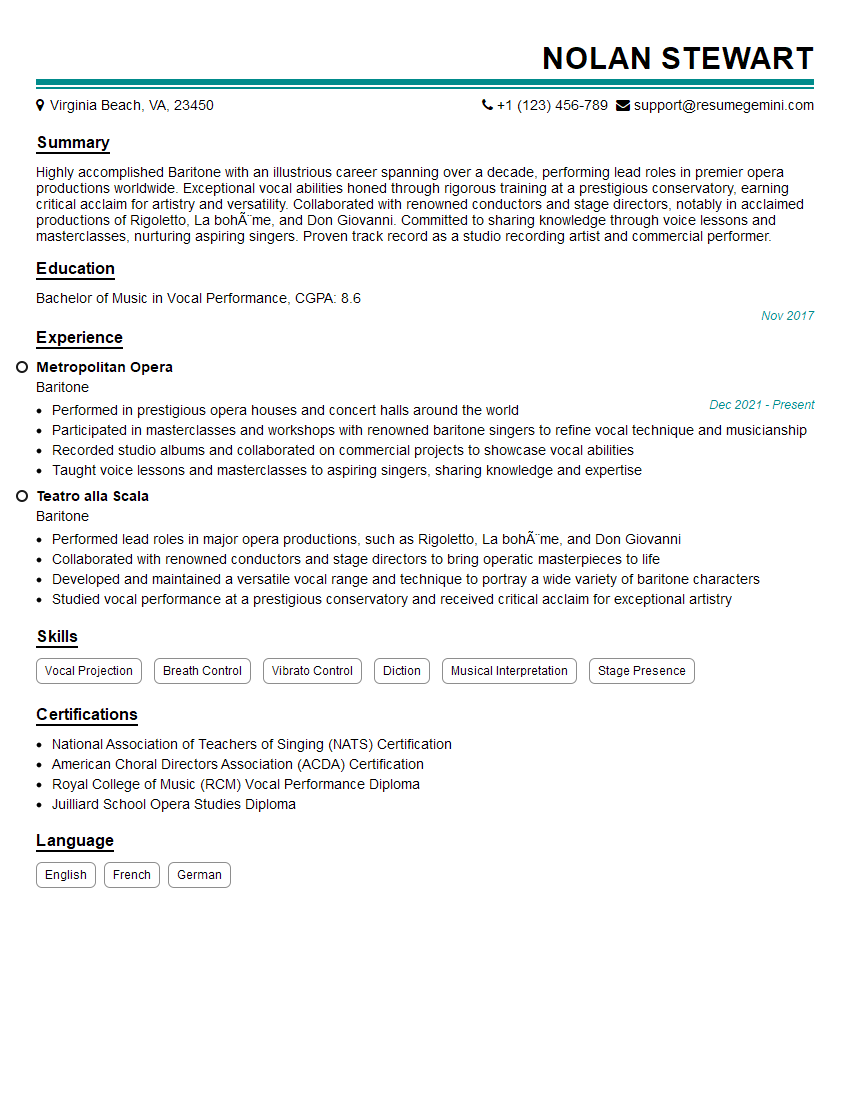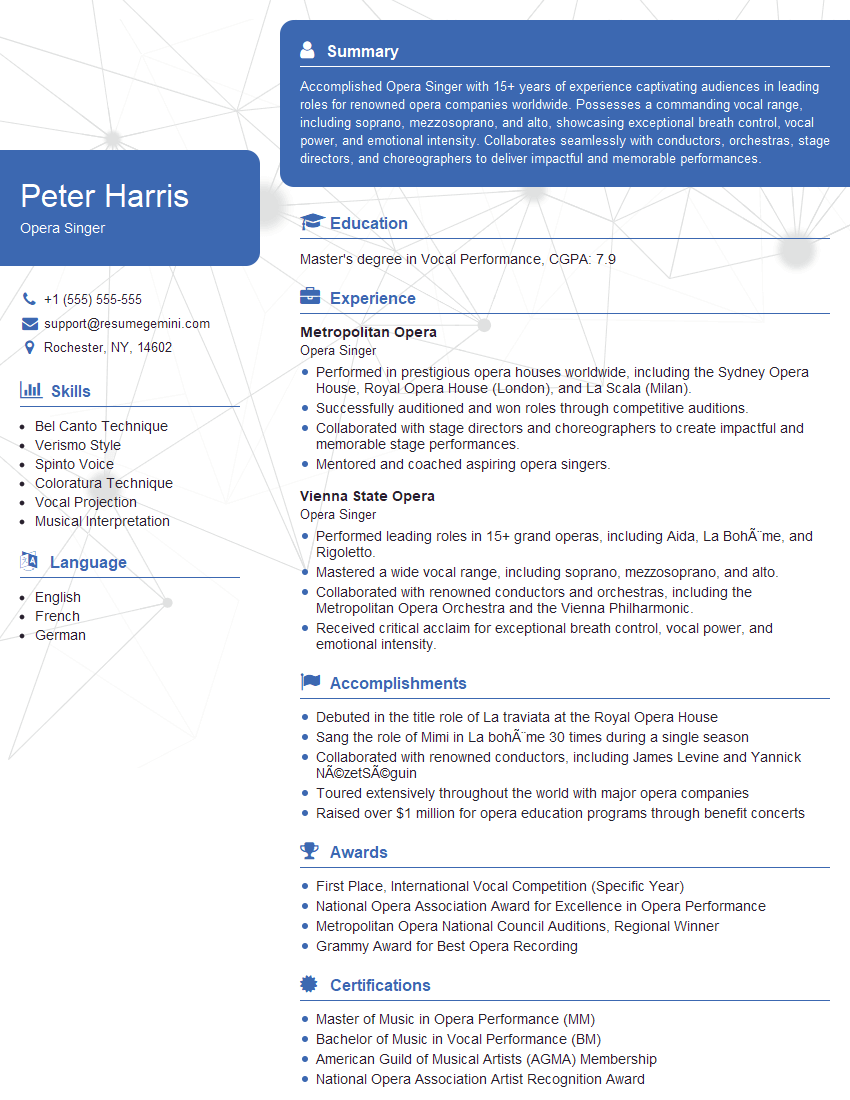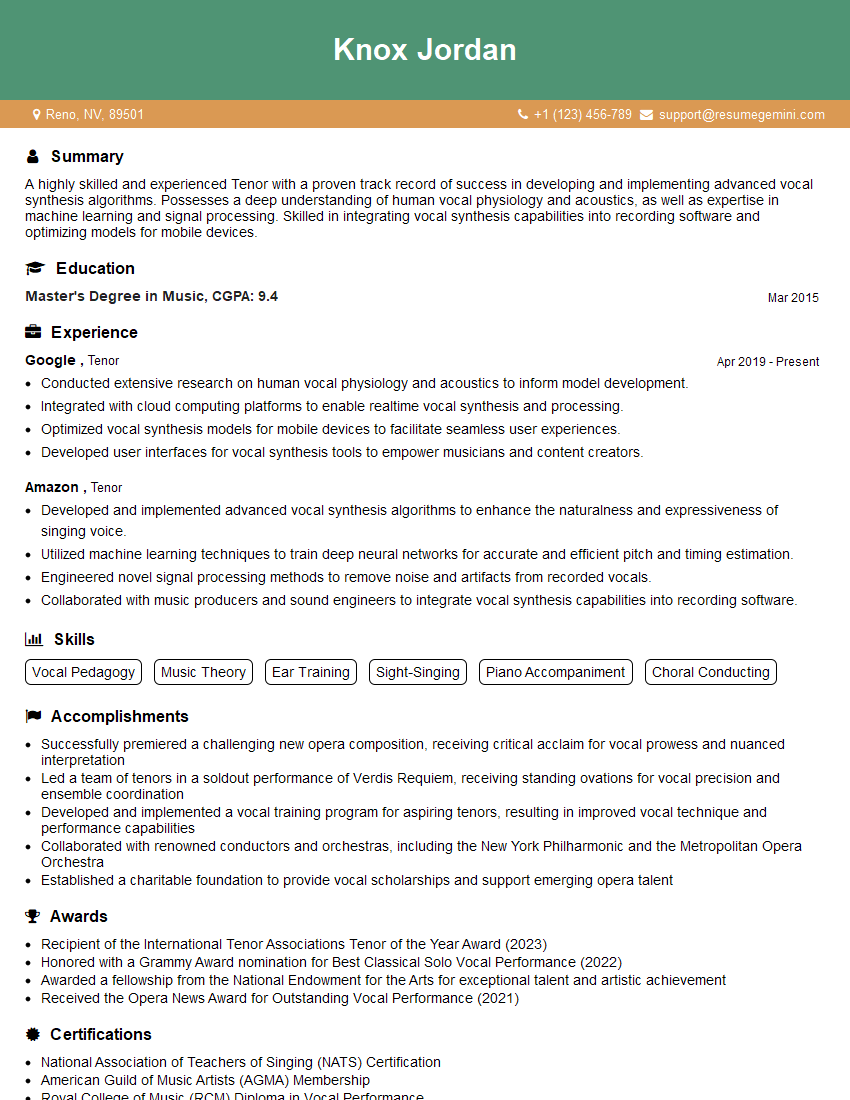Interviews are opportunities to demonstrate your expertise, and this guide is here to help you shine. Explore the essential Opera Singing interview questions that employers frequently ask, paired with strategies for crafting responses that set you apart from the competition.
Questions Asked in Opera Singing Interview
Q 1. Describe your vocal range and fach.
My vocal range comfortably spans from a low C3 to a high C6, though I can extend slightly beyond that depending on the role and vocal demands. My fach, or voice type, is lyric soprano. This designation reflects my voice’s qualities: a relatively light, agile voice with a focus on beauty of tone and legato phrasing, rather than the power and dramatic intensity of a dramatic or spinto soprano. Lyric sopranos are often cast in roles that require lyrical agility, clear diction, and expressive phrasing. Think of roles like Susanna in The Marriage of Figaro or Pamina in The Magic Flute.
Q 2. What are your strengths as an opera singer?
My strengths lie in several areas. Firstly, I possess a strong technical foundation in breath control and vocal placement, allowing me to produce a consistent and resonant tone across my range. This is crucial for the sustained phrases and demanding vocal lines often found in operatic roles. Secondly, I pride myself on my musicality and interpretive skills. I believe opera is not just about hitting the notes, but about conveying the emotion and story behind the music. I strive to connect deeply with the text and character, bringing a nuanced and expressive performance to the stage. Finally, I am a quick learner and adaptable, readily adjusting to the specific demands of various roles and directors.
Q 3. What are your weaknesses as an opera singer, and how are you addressing them?
While I’m strong in many areas, like every singer, I have weaknesses I constantly work on. One area is developing greater power and projection in the heavier repertoire. My lyric soprano voice isn’t naturally built for the dramatic roles requiring sustained fortissimo passages. To address this, I regularly engage in targeted vocal exercises to strengthen my support muscles and expand my dynamic range without compromising my tone quality. Another area is managing vocal fatigue during particularly demanding performances. I’m improving this by focusing on efficient breathing techniques and mindful hydration and rest strategies. This is an ongoing process of refinement and improvement.
Q 4. What is your approach to learning a new opera role?
Learning a new opera role is a multi-faceted process. It begins with a deep dive into the libretto, understanding the character’s motivations, relationships, and emotional journey. I spend considerable time analyzing the score, identifying musical and dramatic highlights, and marking phrasing, dynamics, and emotional inflection points. Then comes the vocal work itself. I start with slow, meticulous practice of individual phrases, paying close attention to diction, intonation, and breath support. I gradually increase tempo and dynamic range, ensuring a seamless blend of technique and interpretation. Rehearsals with a coach are crucial, as they provide invaluable feedback and guidance on stylistic nuances and interpretation. Finally, stage rehearsals are vital to integrate the vocal and dramatic aspects, working collaboratively with the director and fellow performers.
Q 5. How do you manage stage fright?
Stage fright is a common experience for performers, and I’m no exception. However, I’ve developed strategies to manage it. Thorough preparation is key; the more confident I am in my vocal preparation and understanding of the role, the less anxiety I experience. I use visualization techniques, mentally rehearsing the performance to reduce unexpected surprises. Deep breathing exercises help calm my nerves right before a performance. And importantly, I focus on the joy of sharing the music, remembering that I’m not just performing for myself, but for the audience who wants to experience the magic of opera.
Q 6. Describe your experience with different vocal techniques (e.g., bel canto, vibrato).
My training encompassed various vocal techniques. Bel canto, emphasizing breath support, vocal placement, and legato phrasing, forms the bedrock of my technique. It’s the foundation for a beautiful, resonant tone. I’ve also studied the use of vibrato, a slight, controlled wavering of pitch, which adds richness and expressiveness to my singing. The vibrato’s speed and width can be adjusted to suit the emotional context of the music. It’s not just a stylistic flourish but an integral part of shaping phrasing and conveying emotion. I believe in a flexible approach, adapting techniques depending on the role and the composer’s style. For example, a lighter, more delicate approach might suit Mozart, while a more dramatic vibrato could be used in Verdi.
Q 7. How do you maintain your vocal health?
Maintaining vocal health is paramount. My routine includes regular vocal warm-ups and cool-downs, tailored to the demands of the day’s rehearsals or performances. Hydration is crucial; I drink plenty of water throughout the day and avoid dehydrating substances like alcohol and caffeine. I prioritize sufficient sleep, as adequate rest allows my vocal cords to repair themselves. I also avoid excessive shouting or speaking in noisy environments. Regular visits to an ENT specialist for checkups help detect any potential issues early on. A healthy diet rich in fruits and vegetables further supports overall well-being and vocal health. Lastly, I listen to my body and rest my voice when needed, avoiding pushing through fatigue, which can lead to injury.
Q 8. What is your preferred vocal warm-up routine?
My vocal warm-up routine is meticulously designed to prepare my voice for the demands of opera singing. It’s not a one-size-fits-all approach, but rather a personalized system adapted to the specific demands of the role and my current vocal state. It typically starts with gentle humming exercises to loosen the vocal cords, followed by lip trills and tongue trills to improve breath support and coordination. I then progress to scales and arpeggios, gradually increasing the range and complexity.
Crucially, I incorporate exercises that focus on specific areas needing improvement. For instance, if I have a demanding high note in an upcoming performance, I’ll dedicate time to exercises that strengthen that register. I always finish with a few selected phrases from the aria I’m working on, allowing me to gently integrate the warm-up with the performance material. The key is consistency and listening to my body; if something feels strained, I back off. It’s a dynamic process, not a rigid formula.
Q 9. How do you interpret a composer’s intentions in an aria?
Interpreting a composer’s intentions in an aria is a detective job, a fascinating puzzle! It goes far beyond simply hitting the notes. I begin by deeply studying the score itself – the musical phrasing, the dynamics, the harmony, and the overall structure. What emotional journey is the music telling? What is the dramatic context of the aria within the larger opera?
Then, I delve into the historical context. Understanding the composer’s life, the social and political climate of the time, and the prevailing musical styles can illuminate their choices. Finally, I consult scholarly articles and recordings of other singers, but always remembering that the final interpretation must be my own, informed but not dictated. For example, in interpreting a Baroque aria, I might emphasize the ornamentation and the elaborate vocal line to reflect the period’s aesthetic, while in a Romantic aria, the focus may shift to the emotional intensity and expressive power.
Q 10. Discuss your experience with acting in opera.
Acting in opera is not just about singing; it’s about embodying the character completely. It’s a holistic art form demanding a powerful blend of vocal technique and dramatic portrayal. I believe a singer’s physicality, emotional honesty, and understanding of the character’s backstory are just as important as their vocal prowess.
My approach involves deep character study; I scrutinize the libretto, explore the character’s motivations, and examine their relationships with other characters. I collaborate closely with the director to develop a physical and emotional portrayal that is both believable and artistically compelling. For example, in a role requiring fragility, I’ll focus on subtle movements and restrained emotions, while a more powerful role might demand bolder gestures and stronger vocal projection.
Q 11. How do you collaborate with conductors, directors, and other performers?
Collaboration is the cornerstone of successful opera production. With the conductor, communication is key, establishing a clear understanding of tempo, phrasing, and dynamics. This often involves many rehearsals to fine-tune the nuances of the music. With the director, we discuss character interpretation, staging, and blocking, ensuring our visions align seamlessly.
Collaboration with other performers involves mutual respect and a shared artistic vision. We rehearse together, supporting each other and adjusting our performances to create a cohesive ensemble. For instance, in a duet or ensemble piece, we carefully balance our voices and acting to create a unified, powerful performance, being sensitive to the other singers’ needs and contributions.
Q 12. Describe a challenging role you’ve performed and how you overcame the obstacles.
One of the most challenging roles I’ve performed was the title role in Puccini’s Tosca. The vocal demands are immense, requiring a wide range, power, and exceptional control. The emotional arc of the character, from passionate love to despair and ultimate sacrifice, is equally taxing.
Overcoming the obstacles involved rigorous vocal training, meticulously studying the score and libretto, and working closely with a vocal coach to address the technical challenges. Equally important was developing a deep understanding of Tosca’s psychology. I spent considerable time researching her character, exploring her motivations, and crafting a believable portrayal of her emotional journey. The process required significant discipline, resilience, and a commitment to continuous growth. Ultimately, mastering this role enhanced my confidence and vocal capabilities significantly.
Q 13. How familiar are you with Italian, French, or German (as applicable to your repertoire)?
As my repertoire includes works in Italian, French, and German, fluency in these languages is crucial. It’s more than just pronunciation; it’s about understanding the nuances of the language – its rhythm, its emphasis, and its emotional subtext. This understanding is essential for delivering a truly convincing and authentic performance.
I work closely with language coaches to perfect my diction and ensure that I convey the meaning of the text with clarity and expressiveness. This includes studying the etymology and history of words, understanding idioms and figures of speech, and ensuring each syllable is understood and carries its intended emotional weight. True mastery of the language is vital for effective communication and creating a believable portrayal of the character.
Q 14. What is your experience with different vocal styles (e.g., Baroque, Classical, Romantic, Contemporary)?
My experience spans various vocal styles, from the ornamentation and elegance of Baroque music to the power and expressiveness of Romantic works. Each style presents unique challenges and demands a specific approach. Baroque music, for example, requires a focus on agility, ornamentation, and clear articulation. Classical music demands a balance of elegance and precision, while Romantic music often emphasizes emotional intensity and a dramatic flair.
My approach to each style involves a deep understanding of its historical context and aesthetic principles. For instance, I might use a lighter, more agile technique for a Baroque aria, while a Romantic aria might require a richer, more resonant tone and a greater focus on emotional projection. Contemporary works often challenge the singer to explore new vocal techniques and interpretive possibilities, requiring flexibility and an open mind.
Q 15. What is your understanding of breath support and breath control in opera singing?
Breath support and control are the cornerstones of powerful and resonant opera singing. It’s not just about filling your lungs; it’s about employing your diaphragm and abdominal muscles to create a steady, controlled stream of air that supports the vocal cords. Imagine a bellows – the air doesn’t just come in a rush, but is released smoothly and consistently. This allows for consistent tone, increased volume, and prevents vocal strain, especially during long phrases and high notes.
Proper breath support involves engaging your diaphragm, the large muscle below your lungs. You should feel your abdomen expand as you inhale, not just your chest. Exhaling is equally important; you should learn to control the release of air, preventing a sudden drop in pressure that might cause breathiness or a shaky tone. Exercises like diaphragmatic breathing (belly breathing) and sustained vowel sounds are crucial for developing this skill. Without proper breath support, even the most technically proficient singer will struggle with stamina and control, leading to vocal fatigue and potentially damage.
- Diaphragmatic Breathing: Lie on your back, place one hand on your chest and the other on your abdomen. Inhale deeply, feeling your abdomen rise while your chest remains relatively still. Exhale slowly, feeling your abdomen fall.
- Sustained Vowel Sounds (Sostenuto): Sing a vowel sound (like ‘ah’ or ‘oo’) on a single pitch for as long as possible while maintaining a consistent tone and volume. This helps train your muscles to support the sound.
Career Expert Tips:
- Ace those interviews! Prepare effectively by reviewing the Top 50 Most Common Interview Questions on ResumeGemini.
- Navigate your job search with confidence! Explore a wide range of Career Tips on ResumeGemini. Learn about common challenges and recommendations to overcome them.
- Craft the perfect resume! Master the Art of Resume Writing with ResumeGemini’s guide. Showcase your unique qualifications and achievements effectively.
- Don’t miss out on holiday savings! Build your dream resume with ResumeGemini’s ATS optimized templates.
Q 16. Describe your experience with sight-reading music.
Sight-reading is an essential skill for any opera singer, allowing for quick adaptation to new scores and collaborative rehearsals. My experience with sight-reading has been built gradually through years of practice and performance. I start by identifying the key, time signature, and overall style of the piece. Then, I focus on identifying melodic phrases and rhythmic patterns, using my knowledge of musical theory to interpret the notation. I don’t strive for perfection on the first read, but rather aim for a clear understanding of the structure and melody. I treat each sight-reading session as an opportunity to improve my skills. Rehearsals and performances are invaluable, as they provide real-time application and immediate feedback.
For example, during a recent production, I was given a new ensemble piece just a few days before the rehearsal. Using my sight-reading skills, I quickly grasped the basic melody and harmony, allowing me to participate effectively in the rehearsal, improving my part and understanding the harmonies more fully with each run-through. I find that consistent practice, including regular work with unfamiliar scores, is crucial in building one’s ability to effectively sight-read.
Q 17. How do you handle performance anxiety?
Performance anxiety is a common experience for many performers, including opera singers. My approach involves a combination of preparation, mental strategies, and mindful techniques. Thorough preparation is my first line of defense. The more comfortable I am with the music and the performance itself, the less anxious I feel. This includes meticulous rehearsals, paying attention to every detail of the score, and knowing the piece so well that I can almost sing it in my sleep.
Mentally, I practice visualization techniques, imagining myself performing successfully and feeling confident on stage. Deep breathing exercises help calm my nerves before a performance. I also actively engage in positive self-talk, focusing on my skills and accomplishments rather than dwelling on potential mistakes. Finally, I find that having a supportive team around me, including fellow singers, conductors, and stage managers, significantly contributes to my emotional readiness and reduces my anxiety levels. Recognizing that performance anxiety is a normal response and practicing techniques to manage it are crucial for a sustainable and healthy career.
Q 18. Describe your experience with microphone technique for opera performances.
Microphone technique in opera is subtle yet crucial for ensuring clarity and projection without sacrificing the natural beauty of the voice. Unlike pop singing, where amplification is often central, opera aims to project naturally; however, microphones are crucial in larger venues. The key is to use the microphone as an extension of your voice, rather than relying on it to compensate for lack of projection. I approach microphone technique with a focus on maintaining a consistent distance and angle to the microphone to avoid sudden volume changes or proximity effect (an unnatural bass boost). This also helps maintain a balance in vocal blend within an ensemble.
Placement is vital. I work closely with sound engineers to find the optimal microphone placement for each performance space and to ensure a balanced mix between the singer’s voice and the orchestra. Throughout the performance, I must remain aware of my position relative to the microphone, making small adjustments as needed to maintain optimal sound. The most important factor is always the natural vocal quality and resonance which comes from my training and breath control, the microphone is merely an aid.
Q 19. How do you prepare for a performance physically and mentally?
Preparing for an opera performance requires a holistic approach encompassing both physical and mental well-being. Physically, I ensure that I’m well-rested and hydrated. I avoid strenuous activities close to performance time, allowing my vocal cords sufficient rest. A balanced diet and regular exercise are important for maintaining stamina and overall health. Vocal warm-ups are essential; I have a specific routine that includes scales, breathing exercises, and vocalises designed to prepare my vocal apparatus for the demands of performance.
Mentally, I prioritize stress management. I engage in relaxation techniques such as meditation or deep breathing exercises to reduce anxiety. I review the music thoroughly, ensuring I’m confident in my interpretation and execution. This careful preparation fosters a sense of calm and preparedness. Positive visualization and affirmations play a significant role. I also focus on building excitement and anticipation for the performance, transforming nervous energy into positive energy, seeing it as a chance to share my art with an audience.
Q 20. What is your process for selecting repertoire?
Selecting repertoire is a deeply personal and artistic process that involves several factors. I begin by considering the roles that best suit my vocal type and range. I also carefully evaluate the emotional depth and dramatic potential of the piece. I look for roles that challenge me artistically and allow me to showcase my strengths as a singer and actor. The historical and cultural context of the work is also important to me; understanding the composer’s intent and the period’s style helps me create a more nuanced and authentic interpretation.
Furthermore, I also consider the opportunities available. What roles are being offered? What are the venues and conductors? Collaboration with the director and conductor is essential, as their vision and the production’s overall concept will influence my choices. My goal is to choose a repertoire that is both artistically fulfilling and suitable for my current stage of development as a singer, carefully considering the physical and emotional demands of each role.
Q 21. What are your long-term career goals as an opera singer?
My long-term career goals involve a continuous journey of artistic growth and exploration. I aim to establish myself as a versatile and respected opera singer, performing a wide range of roles across different styles and periods. I aspire to work with renowned conductors and directors on prestigious stages both nationally and internationally. My ambition goes beyond mere performance; I also hope to engage in teaching and mentorship, sharing my knowledge and passion for opera with the next generation of singers. I see opera not merely as a career, but as a lifelong journey of learning and artistic expression.
I also wish to participate actively in promoting opera to new audiences, breaking down any perceived barriers and making this art form accessible to a wider range of people. This includes exploring collaborations with other art forms and engaging in outreach projects to educate and inspire future generations of opera lovers. It’s a multifaceted ambition, but the essence lies in the constant pursuit of excellence and the dedication to bringing the beauty and power of opera to the world.
Q 22. What is your understanding of vocal resonance and projection?
Vocal resonance and projection are fundamental to opera singing. Resonance refers to the amplification and enrichment of the sound produced by the vocal cords. It’s achieved by utilizing the body’s natural resonating chambers – the pharynx, mouth, and sinuses – to shape and color the tone. Think of it like a finely tuned instrument; each cavity contributes to the overall timbre and power. Projection, on the other hand, is the ability to send that resonant sound clearly and powerfully to the audience, regardless of the size of the venue. It involves a combination of breath support, efficient vocal technique, and intelligent placement of the sound.
For example, a singer might focus on feeling the vibration of the sound in their mask (the area around the nose and cheekbones) to achieve a focused, resonant tone. Conversely, poor resonance can lead to a thin, breathy sound that lacks power and clarity, even with strong projection attempts. Mastering both resonance and projection allows the singer to command attention and convey emotion effectively to even the farthest seat in a large opera house.
Q 23. Describe your experience working with a vocal coach or teacher.
My experience working with vocal coaches has been transformative. Early on, my teacher focused on the fundamentals: proper breathing techniques (diaphragmatic breathing), posture, and vocal placement. We spent countless hours on vocalises, scales, and exercises designed to strengthen my vocal muscles and improve my control. As I progressed, the coaching shifted to repertoire work, focusing on stylistic interpretation and character development. A particularly valuable lesson involved learning to manage vocal fatigue and prevent injury. My coach taught me the importance of vocal rest, hydration, and avoiding vocal strain. We analyzed recordings of famous singers to understand their unique approaches to phrasing and vocal coloring. This holistic approach, covering technique, repertoire, and vocal health, has been instrumental in my career development. It wasn’t just about hitting high notes; it was about developing artistry and maintaining a healthy voice.
Q 24. How do you adapt your singing to different acoustic environments?
Adapting to different acoustic environments is a crucial skill for any opera singer. A small, intimate recital hall requires a more nuanced and subtle approach than a large opera house. In a smaller space, you might need to reduce volume to prevent the sound from becoming overwhelming. The acoustics of the space dictate how the sound reflects and reverberates, impacting how you deliver your voice. In a large hall, projection becomes paramount, requiring a different technique to ensure your voice carries to the back rows. I achieve this by adjusting my breath support, resonance, and vocal placement. For example, I might focus on a fuller, more forward resonance in a large hall to cut through the sound, while employing a more focused and intimate tone in a smaller space. It’s often about adapting to the space’s reverberation time, which takes careful listening and adjustment of your singing style.
Q 25. How do you handle constructive criticism from directors or conductors?
Constructive criticism is vital for growth, and I embrace it as an opportunity to refine my performance. I approach feedback from directors and conductors with an open mind, actively listening and seeking to understand their perspective. I try to see their comments not as personal attacks, but as suggestions for improvement. For example, a director might suggest altering a phrase’s tempo or dynamic to better serve the drama. A conductor might ask for more clarity in a particular passage. I take notes, ask clarifying questions if needed, and then work diligently to implement the suggestions, always ensuring I retain my personal artistic interpretation. The ability to receive and translate feedback is crucial; a good artist knows that collaborative efforts can lead to much stronger and more nuanced performances.
Q 26. What are your musical influences?
My musical influences are diverse, spanning various eras and styles. Early on, I was captivated by the dramatic power of Verdi and the emotional depth of Puccini. Their works inspired me to pursue opera. I also find inspiration in the vocal agility of bel canto composers like Rossini and Bellini, and admire the expressive power of contemporary composers such as John Adams. Beyond opera, I draw inspiration from classical and jazz musicians and appreciate the nuanced expressiveness that can be found in every genre. These influences have shaped my understanding of musicality and vocal expression, leading to a wide range of stylistic choices in my own performances.
Q 27. What are your strategies for maintaining a healthy work-life balance as a performing artist?
Maintaining a healthy work-life balance as a performing artist is a constant challenge, requiring careful planning and prioritization. I prioritize regular physical activity and relaxation techniques to manage stress, incorporating yoga or meditation into my routine. Time management is crucial; I use calendars and planners to schedule rehearsals, performances, and personal time. Equally important is maintaining a strong support network of family and friends who understand the demands of this profession. I build buffer time into my schedule to avoid burnout and to allow flexibility. This might involve setting aside time for hobbies or personal projects that replenish my creative energy, ensuring I don’t become completely absorbed by my career. It’s a delicate balance, and I continuously adjust my strategies to suit the demands of each performance season.
Q 28. How do you market yourself as a professional opera singer?
Marketing myself as a professional opera singer involves a multi-faceted approach, encompassing both traditional and modern methods. I maintain an updated professional website showcasing my repertoire, biography, and high-quality recordings. I actively network with conductors, directors, and other professionals in the opera world, attending auditions and building relationships. Social media platforms like Instagram and LinkedIn are invaluable tools for sharing updates, performance announcements, and behind-the-scenes glimpses into my work. I also utilize press releases and work with publicists to promote my performances and build media attention. It’s about creating a strong online presence, networking effectively, and consistently seeking out opportunities to showcase my talent and artistry. Creating high-quality promotional materials, including professional headshots and recordings, is equally essential.
Key Topics to Learn for Opera Singing Interview
- Vocal Technique: Understanding breath support, resonance, vocal placement, and agility. Consider how you’ve applied these techniques to various roles and styles.
- Musicality and Interpretation: Demonstrating a deep understanding of musical phrasing, dynamics, and character portrayal. Prepare examples of how you’ve conveyed emotion and story through your singing.
- Repertoire and Style: Familiarity with a wide range of operatic styles, composers, and roles. Be ready to discuss your strengths and preferred repertoire, justifying your choices.
- Language and Diction: Proficiency in the languages commonly used in opera (Italian, French, German, etc.). Be prepared to discuss your approach to clear and expressive diction.
- Stage Presence and Acting: Understanding stagecraft, character development, and physical expression. Reflect on experiences where you’ve integrated singing and acting effectively.
- Collaboration and Teamwork: Discussing your experiences working with conductors, directors, and fellow performers. Highlight your ability to contribute to a cohesive artistic ensemble.
- Professional Development: Demonstrate your commitment to ongoing learning and improvement through masterclasses, workshops, or other professional development activities.
Next Steps
Mastering opera singing opens doors to a fulfilling and rewarding career, offering opportunities for performance, teaching, and artistic collaboration. To maximize your job prospects, creating a strong, ATS-friendly resume is crucial. ResumeGemini is a trusted resource that can help you build a professional and impactful resume, tailored to highlight your unique skills and experiences in the competitive opera world. Examples of resumes tailored to Opera Singing are available to guide you.
Explore more articles
Users Rating of Our Blogs
Share Your Experience
We value your feedback! Please rate our content and share your thoughts (optional).
What Readers Say About Our Blog
Hello,
We found issues with your domain’s email setup that may be sending your messages to spam or blocking them completely. InboxShield Mini shows you how to fix it in minutes — no tech skills required.
Scan your domain now for details: https://inboxshield-mini.com/
— Adam @ InboxShield Mini
Reply STOP to unsubscribe
Hi, are you owner of interviewgemini.com? What if I told you I could help you find extra time in your schedule, reconnect with leads you didn’t even realize you missed, and bring in more “I want to work with you” conversations, without increasing your ad spend or hiring a full-time employee?
All with a flexible, budget-friendly service that could easily pay for itself. Sounds good?
Would it be nice to jump on a quick 10-minute call so I can show you exactly how we make this work?
Best,
Hapei
Marketing Director
Hey, I know you’re the owner of interviewgemini.com. I’ll be quick.
Fundraising for your business is tough and time-consuming. We make it easier by guaranteeing two private investor meetings each month, for six months. No demos, no pitch events – just direct introductions to active investors matched to your startup.
If youR17;re raising, this could help you build real momentum. Want me to send more info?
Hi, I represent an SEO company that specialises in getting you AI citations and higher rankings on Google. I’d like to offer you a 100% free SEO audit for your website. Would you be interested?
Hi, I represent an SEO company that specialises in getting you AI citations and higher rankings on Google. I’d like to offer you a 100% free SEO audit for your website. Would you be interested?
good
